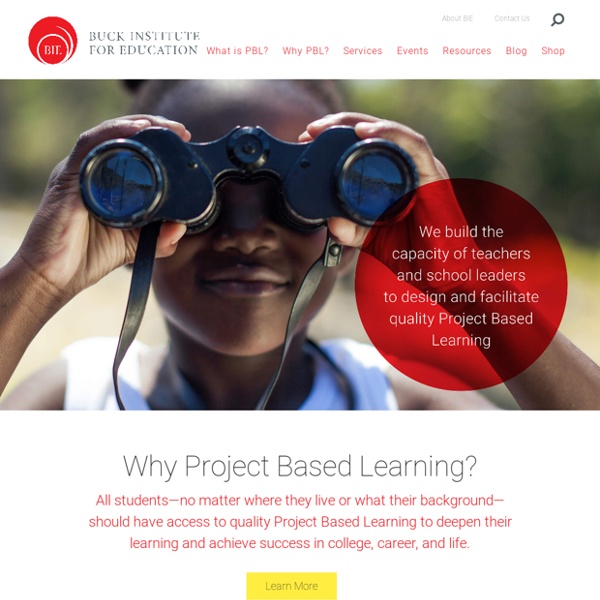



Where Industry Discovers Geospatial Image Analysis Louisville, home of the Kentucky Derby, great food, and this year's 2014 ASPRS annual conference. Held at the Galt House hotel, this year's conference offered a great mix of all things remote sensing over a three-day agenda. It was also co-located with a Joint Agency for Commercial Imagery Evaluation(JACIE) conference, which created a nice atmosphere where some of the best and brightest minds from science and academia could meet.
35 Educational Resources to Encourage Inquiry & Inventive Thinking This is a sponsored post. I’ve scoured the internet, including all of my favourite social media sites, to bring you a fantastic collection of online inquiry and inventive thinking resources that I know will inspire and motivate both you and your students. The collection includes Lego, science, practical activity ideas, engineering, videos, animation, technology and a tonne of fun facts – so there is sure to be something for everyone!
Projects As of July 1, 2013 ThinkQuest has been discontinued. We would like to thank everyone for being a part of the ThinkQuest global community: Students - For your limitless creativity and innovation, which inspires us all. Teachers - For your passion in guiding students on their quest. Partners - For your unwavering support and evangelism. Parents - For supporting the use of technology not only as an instrument of learning, but as a means of creating knowledge.
Project-based learning Project-based learning (PBL) is considered an alternative to paper-based, rote memorization, teacher-led classrooms. Proponents of project-based learning cite numerous benefits to the implementation of these strategies in the classroom including a greater depth of understanding of concepts, broader knowledge base, improved communication and interpersonal/social skills, enhanced leadership skills, increased creativity, and improved writing skills. John Dewey initially promoted the idea of "learning by doing."
PBL and Standardized Tests? It Can Work! It's never too late to address this subject. Yes, many of us are gearing down from (or gearing up for) the epic standardized testing season, enjoying the freedom, released from the many pressures that come with the tests. However, these tests will keep happening. Whether a yearly course assessment, a six-week benchmark exam or a state-level competency test, teachers and students are inundated with testing. Who Owns the Future? by Jaron Lanier – review Jaron Lanier, groundbreaking computer scientist and infectious optimist, is concerned that we are not making the most of ourselves. In Who Owns the Future? he tellingly questions the trajectory of economic value in the information age, and argues that there has been a fundamental misstep in how capitalism has gone digital. For Lanier, late capitalism is not so much exhausted as humiliating: in an automated world, information is more important to the economy than manual labour, and yet we are expected to surrender information generated by or about ourselves – a valuable resource – for free. Information here is a broad term for any conscious intellectual, artistic, or pragmatic contribution to the production of goods, services and cultural output, but it also includes the data that we unconsciously radiate simply by exhibiting certain behavioural and consumer traits. Lanier's project is to foresee how livelihoods might be better sustained in a world in which information is king.
Social Media for Teachers: Guides, Resources, and Ideas Although students are evermore connected to the social web, many of these networks remain out-of-class digital playgrounds where students congregate. In a 2014 survey of 1,000 teachers, just one in five said they use social media regularly with students. Of course, it can be a challenge to incorporate social media into lessons. There are many gray areas for teachers to navigate, like setting guidelines, accessibility at school, and student safety. But to help teachers navigate this ever-changing landscape of social media tools, here are some of the best guides on the web for four popular networks, Facebook, Instagram, Twitter, and Pinterest.
Recommended Resources: Mobile Learning, Digital Activism, Multitasking Professor of urban planning, Amy Hillier, recently spoke at TEDxPhilly to talk about how data visualization technology can map a city’s emotions and memories. Geographic Information System (G.I.S.) technology has become more commonplace and allows statistics to be easily mapped, but in this article, "Mobile Technology: Mapping a City's Emotions, Memories," Hillier argues that we can go one step further. By using data visualization to map the city that isn’t visible to the eye (i.e. sewage system, water pipes, and other underlying infrastructure), it can be used as an experiential tool. She gives an example of two children living in different neighborhoods whose experiences can be quantified by mapping where they eat, where they go for entertainment, and average household income. The hope is that using the technologies in this way can change our environment for the better. Occupy LEGO Universe (online movement)
Seven Ways to Build Your Own Educational Games There are hundreds of places to find educational games and quizzes on the Internet. That said, sometimes you still cannot find quite what you're looking for. In those cases you're better off creating your own games. Here are seven good tools you and your students can use for creating games.
First time hearing about this form of learning. by williamellerbe Oct 15